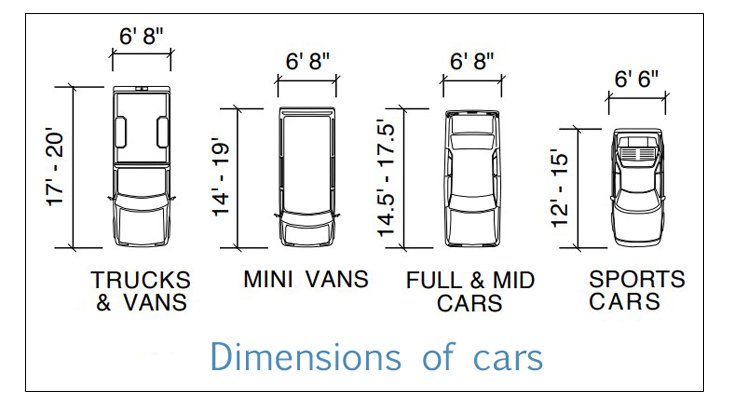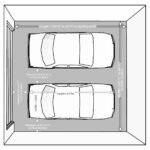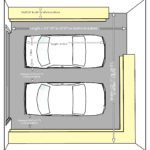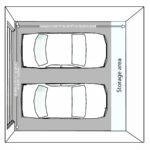Today, an automobile is not just a means of transportation, but oftentimes the only means of transportation used for both routine and emergency purposes. High demand has given rise to numerous car manufacturers. This, in turn, defines cars’ availability and affordability. Because most families have more than one active person, they often need two or more cars. Therefore, owners of rural houses have to build garages that can house two or more vehicles.
Here we are going to discuss things that we should remember when designing a two-car garage, what aspects should be regarded as paramount, and how to calculate size.
Functionality
Well, what are the main functions of a rural garage? First of all, these are:
- Safe parking, which can be simultaneous;
- Convenient car maintenance;
- Seasonal storage of tires and maintenance tools.
In turn, that means that a garage should provide:
- Safe housing of automobiles, regardless of size (one vehicle plus another one with doors open, space margin for improper parking, etc.);
- Type of garage door and number of entrances (a single entrance for all cars or separate ones for each vehicle).
Important: when laying out your garage, please, provide space for simultaneous maintenance of several cars. This requires a separate door for every parking spot and a sufficient amount of space for cars themselves (with doors open as well) and for maintenance.
Also, a garage owner must check roofing materials he or she is planning to use (failure to do so may result in the sagging of the roof or having to use additional support pillars in the middle of the room).
It is also important to note if you are planning to directly connect your garage to your living space.
Common garage layout mistakes and avoiding them
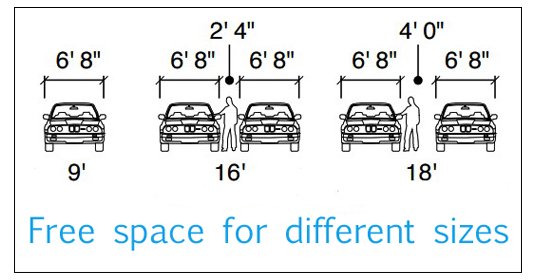
The first and most common mistake is failure to provide enough space. If you are simply putting together the width of one vehicle and that of another one, plus a little ‘margin’, most likely, you will be dealing with serious problems on the very first day of using your garage.
On the other hand, too much space or unjustified addition of extra space can inflate the construction budget and entail high heating bills (if you are planning to use central heating).
Important: there must be enough space in front of and behind a parked car for a man to pass. If you are planning to store tires and/or tools in your garage, specify it in the layout beforehand. Type of garage door is also important: for example, a swing garage door requires more horizontal space than a roller door, and the latter requires extra height.
If there is space in front of your future garage, fix a canopy to protect your car from sun, rain, etc. briefly parked near your house. As to storage area, most garage owners use it for storing tires and car maintenance tools. Suspended shelves are an optimal choice for tires; for tools, you can use the same kind of shelf or a rack, depending on how big your kit is.
Types and structure of doors
For a two-car garage, a proper choice of door is crucial. Each type of door has both advantages and disadvantages.
First, your choice should depend on how independent parking spots are going to be. If you want just one door, it should be wide enough and may require additional support elements (for a roller door) and enough space (for a swing or slide door). Also, you must consider the weight of your door and hence the load on fittings and mechanisms.
If you want a separate door for each vehicle, you should be ready for increased maintenance costs. However, in this case you can choose doors with smaller leaves and thus reduce the load on support elements. A swing door will be ok if there is an opening for each vehicle, and it is much cheaper than a sectional door. However, it requires more space in front of the garage, and may pose you quite a bit of trouble after heavy snow. If there is a good deal of space near the garage, you can fix a slide door. It has several advantages: it moves freely along slides and does not necessitate automation. However, there are some cons as well: you will have to run slides the whole width of the door sideways. Finally, it is going to be a waste of heat.
If there is just small space, and you are planning to have just one entrance, you’d better use an automatic overhead folding sectional door. These doors are great for both single-door and multi-door garages. However, they are more expensive than swing doors.
Important: when specifying separate entrances for each car, it is advisable to leave extra space (about 2-3 feet) for a door opening.
Plan extra space
Extra space for storing tires, tools, and oil products, is a must. It is better to set it up near the wall that is opposite to the garage door. Thus you will provide stable temperature and, for some types of oil products, safety.
If you have specified a storage area in your draft, it may be 6-8 feet deep. Here you can fix suspended shelves and racks. If you are planning to unify a workroom with the garage, you’d better not do that. This is a matter of aesthetics and safety. You’d better place your workbench and/or machinery in a respectively equipped workroom, not in the garage, because a fragment may come loose and seriously (or even irreparably) damage your car.
Besides, a workroom can create a kind of a buffer zone and keep your living space warm and quiet, as it will block the sound of motors and tools.
Size of a two-vehicle garage
For a compact city car, it is better to use a garage at least 18 feet long, 16 feet wide, and 7ft high.
Off-road or other large vehicles require a minimal length/width of 20//30ft respectively, and a door at least 8-9ft high.
This is necessary for convenient storage of vehicles; if you would like to include a storage area or other objects as well, calculate their size according to your needs.

